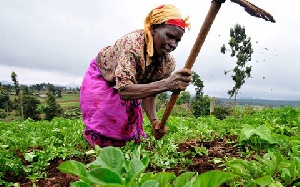Arrangements for the offtake of produce expected to be realized from the Government’s flagship Planting for Food and Jobs(PFJ) are all but complete, the Minister for Food and Agriculture, Hon. Dr. Owusu Afriyie Akoto, has indicated.
All the necessary processes towards the fulfilment of the pledge to support farmers through the purchasing of their produce from the farm gate have been successfully completed, according to the Minister.
Over 200 aggregators have been registered to offtake produces from registered farmers under the PFJ programme across the country.
Addressing a stakeholder meeting to firm up arrangements, Hon. Dr. Owusu Afriyie Akoto, explained that under the current initiative Government has guaranteed an economically viable prices for participating farmers.
This he said, was an unprecedented arrangement which is expected to improve the lots of gallant farmers and enhance their economic livelihoods.
The marketing component, which is the fourth pillar of the PFJ programme is aimed at creating the enabling environment for farmers to dispose off their produce without having to go through the stress of carting them to the big cities.
The National Food Buffer Stock(NAFCO) which is under MOFA, will serve as the intermediary between the farmers and the aggregators. The aggregators will buy directly from the farmers at the approved prices and will in turn deposit the produce at the various designated warehouses after receiving payment from NAFCO.
Hon. Dr. Owusu Afriyie indicated that the era where farmers were left at the mercy of middlemen was over, adding that with the advent of the Planting for Food and Jobs, farmers can now be assured not only of higher yields but also value for their produce.
The CEO of NAFCO Mr. Hannah Abdul Wahab said his outfit was also responsible for the supply of food items to the various schools as part of the Free SHS.
He said all the necessary preparations had been dons to roll out the programme, stressing that NAFCO is in a pole position to buy and store the surpluses as part of the strategic plans to ensure regular food supply to its stakeholders including ministries, departments and agencies.
Business News of Saturday, 30 September 2017
Source: otecfmghana.com













